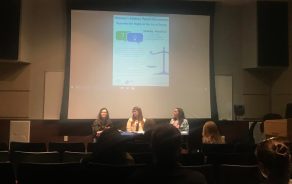By Sydney Orpano
Women’s reproductive rights are under assault by recent legislation put into effect under President Donald Trump’s administration. A panel presentation on campus showcased some tough policies.
“Women’s History Panel Discussion: Reproductive Rights in the Era of Trump” was presented March 25 at College of Southern Nevada’s Charleston campus. Three panelists spoke to an audience of approximately 50 people. Those in attendance were fired up wanting to protect women’s right to choose.
The panel included three experts: Amy Rose, legal director for American Civil Liberties Union of Nevada; Ranita Ray, assistant professor of sociology at University of Nevada, Las Vegas; and Lindsey Harmon, executive director for Planned Parenthood for Nevada.
Topics explored included the following: Mexico City policy known as the global gag rule, defunding Planned Parenthood, the Heartbeat Protection Act of 2019, and some historical cases that supported women’s rights, among other important topics.
“Between Jan. 1 and March 20, there have been 304 abortion restrictions introduced in states across the country,” said Rose, a panelist from the stage. “Not all have passed but they are here. This is definitely a move by the states. They see this time in our country as an opportunity to push the limits and to see how far they can go.”
Rose explained that one of the first policies of the Trump administration was to reinstitute the global gag rule, which started under George W. Bush and went away under Barack Obama, to refuse funding to non-governmental organizations that provide abortion counseling, sex education and contraception abroad.
From the platform another panelist Ray stated, “This is not the first administration that had impacted or constrained the liberation of bodies. This is not the first time and it is not going to be the last time.”
The third panelist Harmon shared her thoughts from the stage. “Seven-tenths of Americans support access to abortion, so there is a disproportionate amount of laws enacted in states that don’t accurately reflect what the American people want.”
Another topic Harmon brought up was the disenfranchisement of women around the world who are oftentimes victims of abuse, neglect, poverty and lack of education.
“All of those indicators lead you to believe that is a way to keep women at a disadvantage in society,” Harmon said. “The only way to control women and to keep them in their place is to control their reproductive health.”
Sondra Cosgrove, professor of social sciences at CSN, said, “The Heartbeat Bill is not constitutionally based on the 1992 Supreme Court ruling Planned Parenthood v. Casey in which the Supreme Court ruled that a state may not limit the right to an abortion during the period in which the fetus is not viable outside of the womb.”
On Jan. 9, Congress introduced Defund Planned Parenthood Act of 2019. According to the bill, this will be a moratorium on federal funding to Planned Parenthood.
Shelley Sendak, who teaches women studies at CSN, commented on this. “Planned Parenthood and the right to abortion is necessary as long as there is going to be sexual violence against women. Does this affect all Americans? Yes. This is about how we treat people. What basic rights we give to autonomy over your body.”
When asked if President Trump marks a new era for reproductive rights in America, Sendak responded, “No. Trump is a symptom. I think the reaction against Trump is marking a new era.”
According to CSN’s social science Instructor Kenneth Fernandez, women’s rights have been challenged throughout U.S. history and will continue to be. Over the last two decades there have been laws and policies established that put restrictions on abortion such as the waiting period before having an abortion.
Although recent legislation is meant to diminish access to abortions, many courts and activists are fighting to undo these recent decisions.




